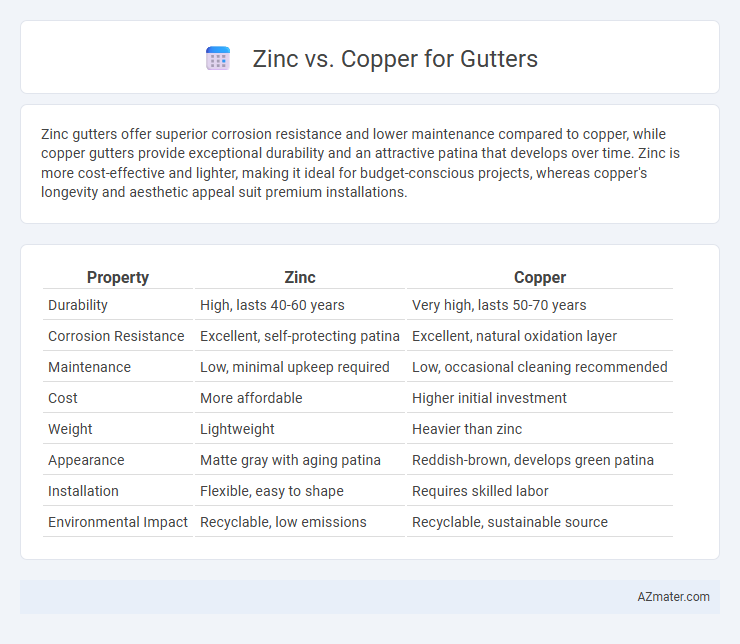Zinc gutters offer superior corrosion resistance and lower maintenance compared to copper, while copper gutters provide exceptional durability and an attractive patina that develops over time. Zinc is more cost-effective and lighter, making it ideal for budget-conscious projects, whereas copper's longevity and aesthetic appeal suit premium installations.
Table of Comparison
| Property | Zinc | Copper |
|---|---|---|
| Durability | High, lasts 40-60 years | Very high, lasts 50-70 years |
| Corrosion Resistance | Excellent, self-protecting patina | Excellent, natural oxidation layer |
| Maintenance | Low, minimal upkeep required | Low, occasional cleaning recommended |
| Cost | More affordable | Higher initial investment |
| Weight | Lightweight | Heavier than zinc |
| Appearance | Matte gray with aging patina | Reddish-brown, develops green patina |
| Installation | Flexible, easy to shape | Requires skilled labor |
| Environmental Impact | Recyclable, low emissions | Recyclable, sustainable source |
Introduction to Gutter Materials
Zinc and copper are two popular gutter materials known for their durability and aesthetic appeal. Zinc gutters offer excellent corrosion resistance and develop a protective patina over time, enhancing longevity with low maintenance. Copper gutters provide a distinctive appearance and superior strength, often chosen for historic or high-end homes due to their ability to withstand harsh weather conditions while aging gracefully.
Overview of Zinc and Copper Gutters
Zinc gutters are prized for their durability and natural corrosion resistance, often lasting over 50 years with minimal maintenance due to their self-healing patina. Copper gutters offer exceptional longevity, sometimes exceeding 70 years, and develop a distinctive green patina that protects against corrosion while enhancing aesthetic appeal. Both metals provide robust solutions for gutter systems, with zinc favored for a matte finish and cost-effectiveness, and copper chosen for its high-end appearance and superior weathering properties.
Durability Comparison: Zinc vs Copper
Zinc gutters typically offer durability of 40 to 60 years due to their corrosion-resistant properties and self-healing patina that protects against weather damage. Copper gutters, known for their exceptional longevity, can last over 70 years while developing a naturally protective green patina that further enhances resistance to corrosion. Both materials provide strong durability, but copper's extended lifespan and aesthetic aging make it a premium choice for long-term gutter solutions.
Aesthetic Appeal and Visual Differences
Zinc gutters offer a matte, natural patina that evolves over time into a soft gray finish, providing a subtle and modern aesthetic ideal for contemporary architectural styles. Copper gutters shine with a bright, metallic luster that gradually transforms into a rich, greenish-blue verdigris, adding a classic and elegant visual contrast perfect for historic or high-end homes. The choice between zinc and copper significantly impacts the home's visual appeal, with zinc offering understated sophistication and copper delivering a bold, timeless statement.
Cost Analysis and Budget Considerations
Zinc gutters typically cost between $10 to $15 per linear foot, offering long-term savings due to their durability and low maintenance needs, whereas copper gutters range from $20 to $30 per linear foot, reflecting their premium material price and aesthetic appeal. Budget considerations should factor in zinc's resistance to corrosion and need for fewer repairs, versus copper's higher upfront cost but superior longevity and distinctive patina development that can enhance property value. Choosing between zinc and copper gutters depends on balancing initial installation expenses against long-term performance and maintenance budgets.
Installation Process and Requirements
Zinc gutters require precise soldering techniques and templates during installation to ensure seamless joints and prevent leaks, with a typical lifespan exceeding 50 years due to its corrosion resistance. Copper gutters demand a skilled craftsman for accurate bending and soldering, often involving heavy gauge copper sheets that require special tools, and their natural patina develops over time, providing durable protection against weathering. Both materials necessitate strong structural support systems to accommodate their weight, with zinc generally lighter than copper, influencing mounting hardware choices and roof compatibility.
Maintenance Needs and Longevity
Zinc gutters are known for their low maintenance needs due to their natural oxide coating that prevents corrosion and self-heals scratches, offering a lifespan of up to 80-100 years. Copper gutters require moderate maintenance to preserve their appearance, as patina development can require cleaning or sealing, but they also provide exceptional longevity of around 50-70 years. Both metals withstand harsh weather well, but zinc offers a longer-lasting, near maintenance-free solution compared to copper's aesthetic upkeep.
Environmental Impact and Sustainability
Zinc gutters offer superior longevity and require less frequent replacement, reducing material waste and environmental disruption compared to copper. Copper gutters, while highly durable and recyclable, involve energy-intensive mining and processing that contribute to higher carbon emissions. Choosing zinc supports sustainability goals due to its lower environmental footprint and natural resistance to corrosion, minimizing maintenance and resource consumption over time.
Weather Resistance and Performance
Zinc gutters offer exceptional weather resistance due to their natural patina that protects against corrosion and harsh environmental conditions, extending their lifespan beyond 50 years. Copper gutters provide superior durability and develop a protective greenish patina called verdigris, which enhances resistance to rust and weather damage while requiring minimal maintenance. Both metals perform well in extreme climates, but copper's higher cost is often balanced by its unmatched aesthetic appeal and longevity in diverse weather scenarios.
Choosing the Best Option for Your Home
Zinc gutters offer durability, corrosion resistance, and a natural patina that protects against weathering, making them ideal for long-term low-maintenance roofing systems, while copper gutters provide superior aesthetic appeal through their distinctive reddish-brown color and exceptional resistance to rust. Homeowners should consider climate factors; zinc excels in harsh, acidic environments due to its self-healing properties, whereas copper is favored for its longevity and minimal upkeep in less corrosive settings. Budget constraints and design preferences also play critical roles, with zinc generally more cost-effective and copper adding significant architectural value to upscale homes.

Infographic: Zinc vs Copper for Gutter
 azmater.com
azmater.com